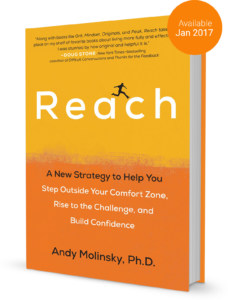The Reach Interview Series is an informal dialogue between me and respected thought leaders around the theme of my new book, Reach: A New Strategy to Help You Step Outside Your Comfort Zone, Rise to the Challenge and Build Confidence.
Dr. Emma Seppala spends her life helping people achieve happiness. And she does this in multiple ways – as the science director of Stanford University’s Center for Compassion and Altruism Research and Education, as the Co-Director of Yale’s Emotional Intelligence Project and a lecturer on the Psychology of Happiness, and as the author of the book the Happiness Track. In this chat with Emma, we talk about comfort zones, happiness, and the challenges of staying resilient in difficult times.
 AVAILABLE NOW
AVAILABLE NOW
Reach A New Strategy to Help You Step Outside Your Comfort Zone
Prescriptive and based not only on my groundbreaking research but on my own quest to get out of my comfort zone, Reach will help you take the thing you are most afraid of doing and make it a proud part of your personal repertoire.